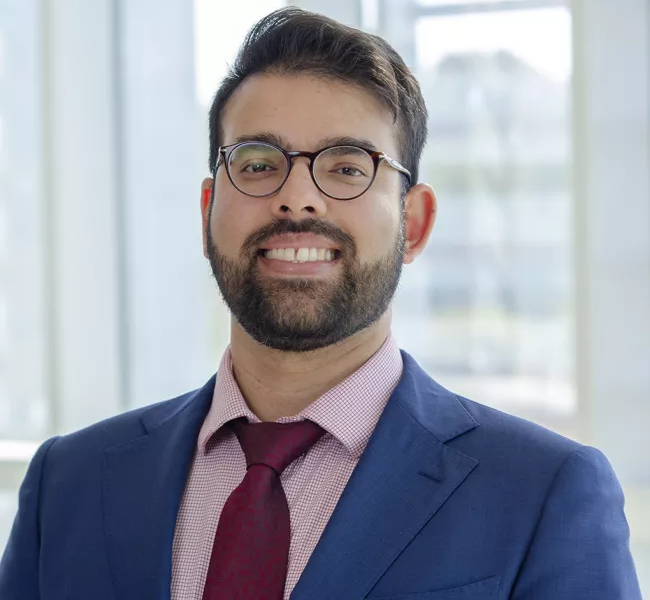When Zahid Iqbal, MD, and his family were considering a move to Omaha, he knew he wanted to be at the best medical center in the metro area. He decided the UNMC Department of Anesthesiology was a perfect fit.
“We wanted to move to Omaha because my wife grew up here, so I kind of put my feelers out over time,” Dr. Iqbal said. “We were in Chicago, and then St. Louis most recently, and I was looking for the right fit. We had just had our third child and at that point, my wife suggested looking for a job here. I knew this was the institution specifically for me.”
Dr. Iqbal joins UNMC from Washington University in St. Louis, where his clinical contributions included multispecialty OR anesthesia, trauma anesthesia, ICU medicine and tele-ICU medicine.
This experience, combined with his background in biomedical engineering, proved to be formative in Dr. Iqbal’s interest in utilizing new technologies to optimize patient experiences.
“At some point during my undergraduate training, I decided to attend medical school,” Dr. Iqbal said. “Nothing really clicked more than anesthesia. It made sense from a physiological perspective, and the technology involved was exciting to me at the time.”
He has a strong interest in continuing the work of applying new optimization strategies to our patients, streamlining preoperative care at UNMC, advancing education in perioperative medicine and contributing to the clinical research program in our preoperative clinic.
As the newly appointed director of PECC, Dr. Iqbal’s main goals are to continue the excellent care that the clinic already provides, increase availability to patients and create a safe, progressive atmosphere for both patients and staff.
“Patients are getting more and more complex,” Dr. Iqbal said. “Coordinating care for these patients can be difficult, especially as we cast a wider net, and some are coming from hours away. Figuring out the best way to coordinate that care is important for the clinic.”
Dr. Iqbal plans to use available technology such as telehealth to expand the clinic’s footprint. With many patients from outside the metro area, telehealth appointments can be used to gather patient history for electronic health records and provide routine pre-op services. The data is used to put together a complete chart for the surgical team, rather than piecemeal different charts on the day of surgery.
“Patients can see us without driving two hours to chat about anesthesia and we are able to provide that same level of care,” Dr. Iqbal said. “Things get more advanced as patients age, it’s harder and harder for them to keep track of their medications and other therapies online. Telehealth also provides availability to patients by increasing our presence in the community.”
Another objective will be to increase focus on advancing care in terms of leveraging newer technologies to optimize patient care.
“My wife says I have a ‘tinkering brain.’ I want to lean into that,” Dr. Iqbal said. “There are different routes for getting things done and increasing efficiency, but the goal is to do it safely.”
For example, Dr. Iqbal said the current methods of evaluating perioperative risks are relatively antiquated and subjective. He eventually plans to explore newer technology, such as machine learning algorithms and artificial intelligence to increase efficiency, which will positively impact patients and care providers.
“These are all things that are not too far away, as evidenced by what’s going on right now,” Dr. Iqbal said. “Simply put, we don’t want to cancel patients’ surgeries, and anything we can do to optimize patient care is very relatable.”
Another focus area will be advancing education in perioperative medicine, including adding a lecture series. Residents can spend valuable one-on-one time with the attending physician evaluating patients. Providing lecture opportunities for interested nurse practitioners and physician assistants on staff will further professional growth and development.
“Our residents come to the clinic and pretty much get free rein,” Dr. Iqbal said. “The way it’s set up now is nice in that they get to spend valuable time in the clinic with the attending. They get to see a wider variety of patients, as opposed to just their six patients if they were assigned to a group of patients.”
Dr. Iqbal said he loves to share his love of “tinkering” with his three children. In addition to trips to the zoo, hanging out as a family and visiting with Nana and Papa, they enjoy cooking as a family.
“I’m a big nerd. So, we like to do science experiments on the weekends and things like that,” Dr. Iqbal said. “But you know, they spend every minute outside just, you know, being a kid and doing whatever kinds of experiments they come up with, for better or worse.”
Troy Wildes, MD, the vice chair of perioperative medicine, quality and safety, praised the outgoing PECC, Jessica Sayre, MD.
“The PECC program achieved many substantive improvements under the leadership of Dr. Sayre,” said Troy Wildes, MD, the vice chair of perioperative medicine, quality and safety. “We are excited about the future growth of the PECC program, both in size and scope, under the leadership of Dr. Iqbal. Please join us in congratulating him on this leadership role.”
